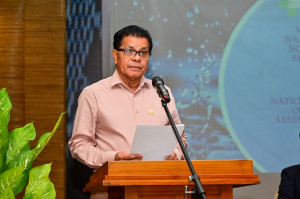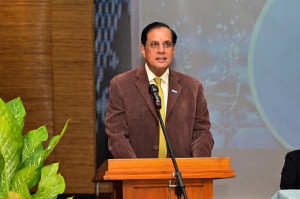The Government of Timor-Leste, through the Ministry of Health, in collaboration with the World Health Organization (WHO) and other partners, held the National Seminar on Global Analysis and Assessment of Water and Sanitation on October 3, 2024, in Dili. The event, chaired by the Vice-Minister for Institutional Strengthening of Health, José dos Reis Magno, had the main objective of discussing the implementation of policies and strategies to improve access to drinking water and basic sanitation throughout the country. 
In his speech at the opening of the seminar, the Vice-Minister highlighted the progress that has already been made, with 80% of rural population and 96% of urban population now having access to basic water services. However, he stressed that much remains to be done to ensure that all communities, especially the most vulnerable, have safe and sustainable access to these essential services. “Our mission is to ensure that communities do not fall ill due to lack of access to clean water, sanitation and proper hygiene conditions. This global assessment initiative is an important tool for monitoring the quality and effectiveness of the services provided,” said the Vice-Minister.
The seminar focused on the validation of the GLAAS survey (Global Analysis and Assessment of Sanitation and Drinking-Water), a global initiative promoted by UN-Water that aims to monitor progress in access to drinking water and sanitation, which is essential for achieving Sustainable Development Goal 6 (SDG 6). This SDG seeks to ensure the availability and sustainable management of water and sanitation for all by 2030. For the first time, Timor-Leste is using the e-GLAAS digital platform, which demonstrates the country’s commitment to adopting technological solutions to strengthen its WASH (Water, Sanitation and Hygiene) systems. 
The World Health Organization Representative in Timor-Leste, Arvin Mathur, underlined the importance of this collaboration, stating that “the validation of the GLAAS survey is an important step towards strengthening WASH systems in Timor-Leste. This platform provides essential data that will support informed decision-making and the implementation of effective policies to ensure universal access to safe drinking water and sanitation, particularly in the most vulnerable communities.”
The event was also attended by general and national directors of the Ministry of Health, representatives of BTL, E.P., INETL, I.P., as well as other heads of department and professionals from the sector. The working session focused on analyzing the gaps in WASH systems and defining priority actions to improve governance, financing and institutional capacities in the water and sanitation sector.